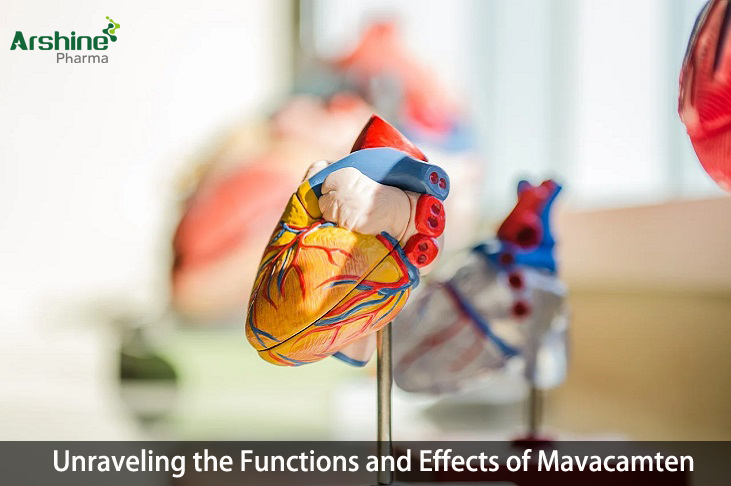
Mavacamten, a novel medication with a targeted mechanism of action, has emerged as a groundbreaking therapeutic option in the realm of hypertrophic cardiomyopathy (HCM). Recognized for its ability to modulate cardiac muscle function at the molecular level, mavacamten has become a focal point in the treatment of HCM, offering a new avenue to improve the lives of individuals affected by this cardiac disorder. Delving into the multifaceted functions and effects of mavacamten involves exploring its mechanisms of action, therapeutic applications, and considerations in clinical use.
Introduction to Mavacamten
Mavacamten, a myosin inhibitor, is designed to address the underlying molecular and biomechanical abnormalities associated with hypertrophic cardiomyopathy. HCM is a genetic disorder characterized by the thickening of the heart muscle, particularly the left ventricle. This condition can lead to various complications, including impaired cardiac function, arrhythmias, and heart failure. Mavacamten's unique mechanism of action positions it as a potential game-changer in the management of HCM.
Mechanism of Action
Mavacamten selectively inhibits the activity of cardiac myosin, a motor protein essential for muscle contraction. Myosin is a key player in the process of converting chemical energy into mechanical work during cardiac muscle contraction. In individuals with HCM, there is often hypercontractility and increased ATP consumption in the heart muscle. Mavacamten addresses this by reducing the excessive contractility, providing a targeted approach to mitigate the effects of HCM.
Functions and Effects
1. Myosin Inhibition
The primary function of mavacamten is the inhibition of myosin, specifically the myosin ATPase enzyme. Myosin ATPase is responsible for converting adenosine triphosphate (ATP) into mechanical energy, driving the contraction of the cardiac muscle. By selectively inhibiting myosin ATPase, mavacamten reduces the hypercontractility seen in HCM, leading to improved ventricular function and decreased energy consumption.
2. Ventricular Function Improvement
HCM often results in impaired ventricular function, impacting the heart's ability to pump blood effectively. Mavacamten's modulation of myosin activity contributes to improved ventricular function, allowing for more efficient and coordinated contractions. This enhancement in ventricular function can alleviate symptoms and improve overall cardiac performance.
3. Symptom Reduction
Patients with HCM commonly experience symptoms such as shortness of breath, chest pain, and fatigue due to the impaired cardiac function. Mavacamten has demonstrated efficacy in reducing these symptoms, providing relief and improving the quality of life for individuals living with HCM. Symptom reduction is a crucial aspect of the overall therapeutic impact of mavacamten.
Therapeutic Applications
1. Hypertrophic Cardiomyopathy
The primary therapeutic application of mavacamten is in the management of hypertrophic cardiomyopathy. HCM is often caused by genetic mutations that lead to abnormal cardiac muscle thickening. Mavacamten's targeted inhibition of myosin addresses the underlying biomechanical abnormalities associated with HCM, making it a potentially disease-modifying therapy.
2. Symptomatic Relief
Beyond its disease-modifying potential, mavacamten provides symptomatic relief in individuals with HCM. By improving ventricular function, reducing hypercontractility, and alleviating symptoms such as shortness of breath and chest pain, mavacamten enhances the overall well-being of patients with HCM.
3. Potential Impact on Long-Term Outcomes
Mavacamten's ability to address the molecular and biomechanical aspects of HCM raises the possibility of impacting long-term outcomes. By modifying the natural course of the disease, mavacamten has the potential to improve prognosis and reduce the risk of complications such as heart failure, arrhythmias, and sudden cardiac death. Long-term studies are essential to further elucidate the lasting effects of mavacamten on the progression of HCM.
Effects and Considerations in Clinical Use
1. Efficacy in Clinical Trials
Clinical trials have demonstrated the efficacy of mavacamten in improving symptoms and functional status in patients with HCM. The EXPLORER-HCM trial, a pivotal phase 3 study, showed significant improvements in exercise capacity, symptoms, and quality of life in patients receiving mavacamten compared to those on placebo. These findings underscore the potential of mavacamten as a transformative therapy for HCM.
2. Safety Profile
The safety profile of mavacamten is a critical consideration in its clinical use. Overall, mavacamten has demonstrated good tolerability in clinical trials. Adverse effects reported in studies include mild-to-moderate events such as headache, fatigue, and dizziness. Long-term safety data will continue to be monitored as mavacamten is introduced into clinical practice.
3. Patient Selection
Mavacamten's targeted mechanism of action and disease-modifying potential highlight the importance of careful patient selection. The identification of individuals with specific genetic mutations associated with HCM and those who may benefit the most from myosin inhibition is crucial. Genetic testing and a comprehensive evaluation of each patient's clinical characteristics will play a pivotal role in determining the suitability of mavacamten for individualized treatment plans.
4. Ongoing Research and Future Perspectives
As mavacamten enters clinical practice, ongoing research will continue to explore its long-term effects, potential combination therapies, and broader applications. The evolving landscape of precision medicine in cardiology may see mavacamten integrated into tailored approaches for individuals with specific genetic profiles or unique clinical presentations.
Conclusion
Mavacamten represents a significant advancement in the management of hypertrophic cardiomyopathy. Its targeted inhibition of myosin, leading to improved ventricular function and symptomatic relief, offers a promising therapeutic option for individuals affected by this complex cardiac disorder. The disease-modifying potential of mavacamten opens new avenues for long-term management, impacting not only symptoms
